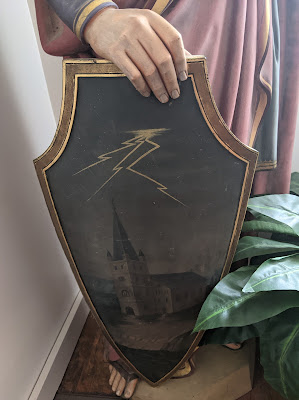In the late 1840s, a Luxembourgian immigrant named Peter Gehlen constructed a limestone house in a brand new village named St. Donatus. It's still there, in fact, although today it's a B and B and ale house right downtown, a domicile that, in fine European tradition, was built long ago to function as both barn and home.
Donatus's saintliness has a story, as you can well imagine, and, yes, there's a woman in it, a beautiful young libertine, more than a little spoiled, who wants what she can't have, specifically that young handsome soldier her Emperor grandfather respects as an aid and a military leader. You may have heard of her grandfather, Emperor Marcus Aurelius. Two thousand years later, what of the tale is legend and what is fact cannot be determined; but the tale that still is told, as you might expect, poses sinful passions going to battle with passions of the soul.
The stories lack the literal sensuality of Last Tango--after all, we're talking about a saint here. But enough is said to allow the imagination to create filmy bedclothes in candle-lit rooms and sufficient comeliness to make young Donatus sweat. But the kid had sworn a vow of perpetual virginity that he simply would not break.
Thus, the young soldier remained true to his confessions, held tight the sacred pledges he had made after God had answered his prayer; and he died, a martyr, for the pious commitment that little, harmful hussy couldn't shake, no matter what she tried. It's a plot line that doesn't wander far from the tale of wunderkind Joseph thusly besieged in the bedroom of Pharoah's wife.
St. Donatus holds a palm branch in his left hand, signifying his martyrdom. Emperor Aurelius couldn't turn down his dandy granddaughter and, subject to her charms, drew his sword. For his unshakeable spiritual commitments, St. Donatus earned a central position in the altar in the church across the street, as well as a significant place just inside the door of a 170-year old B and B just off Main.
"Patron saint of storms," that handwritten sign reads, which explains the lightening bolts in his right hand on the image in the church, and the figures etched on shield he holds in the sculpture in the inn across the street.
According to the version of Calvinist history I was taught, praying to saints was not only misguided, it was sinful. I'll confess that even today the whole relationship between believers and patron saints seems a stretch.
But those bolts of lightning is a visual reminder that there's more to the story.




No comments:
Post a Comment